People go to flea markets for all sorts of reasons. Some look for bargains, some seek out treasures and collectibles, while still others just go tos ...
You might consider targeting a niche, such as rare Marvel comics or Dark Horse comics.
We earn commissions if you shop through the links below. Read more
Written by: Carolyn Young
Carolyn Young is a business writer who focuses on entrepreneurial concepts and the business formation. She has over 25 years of experience in business roles, and has authored several entrepreneurship textbooks.
Edited by: David Lepeska
David has been writing and learning about business, finance and globalization for a quarter-century, starting with a small New York consulting firm in the 1990s.
Published on April 30, 2023

Investment range
$14,300 - $28,300
Revenue potential
$144,000 - $288,000 p.a.
Time to build
3-6 months
Profit potential
$43,200 - $86,400 p.a.
Industry trend
Growing
Commitment
Full-time
Key considerations to remember when starting your comic book store:
You May Also Wonder:
Is a comic book store profitable?
The profitability of a comic book store depends on various factors such as the location, size, inventory, competition, and customer base. However, it is possible to run a profitable comic book store if managed effectively.
What is the growth potential of a comic book store?
The growth potential of a comic book store can vary depending on the location and the local demand for comic books. However, with the increasing popularity of superhero movies and TV shows, the demand for comic books has also increased, which can provide opportunities for growth in the industry. Additionally, comic book stores can also expand their offerings to include merchandise and collectibles related to popular franchises, further increasing their growth potential.
What type of business is a comic book store?
A comic book store is a retail business that specializes in selling comic books, graphic novels, and related merchandise. It is part of the entertainment industry and often appeals to a specific niche market.
Can you start comic book store on the side?
It is possible to start a comic book store on the side, but it may require a significant investment of time and money. Running a successful comic book store requires knowledge of the industry, marketing skills, and a strong customer base. Starting on a smaller scale, such as selling online or at conventions, can be a good way to test the waters before investing in a physical store.
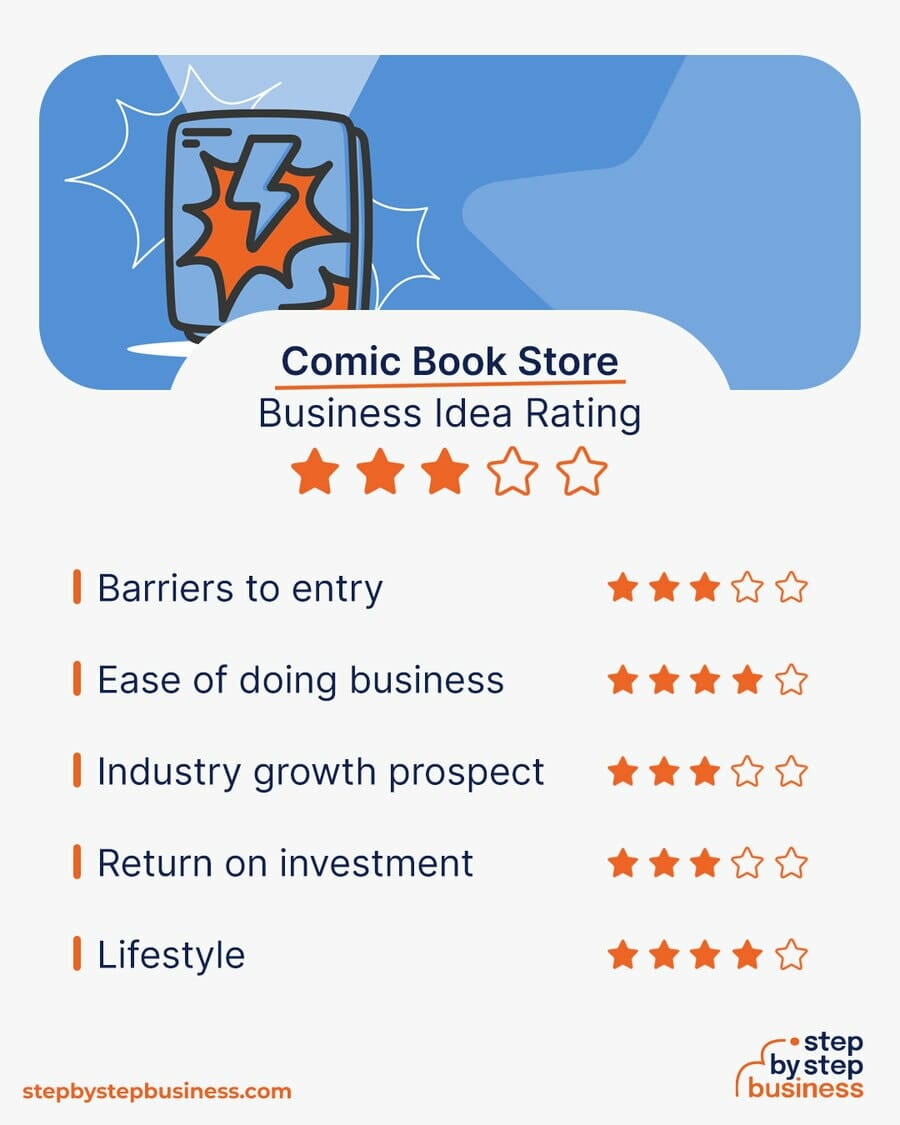

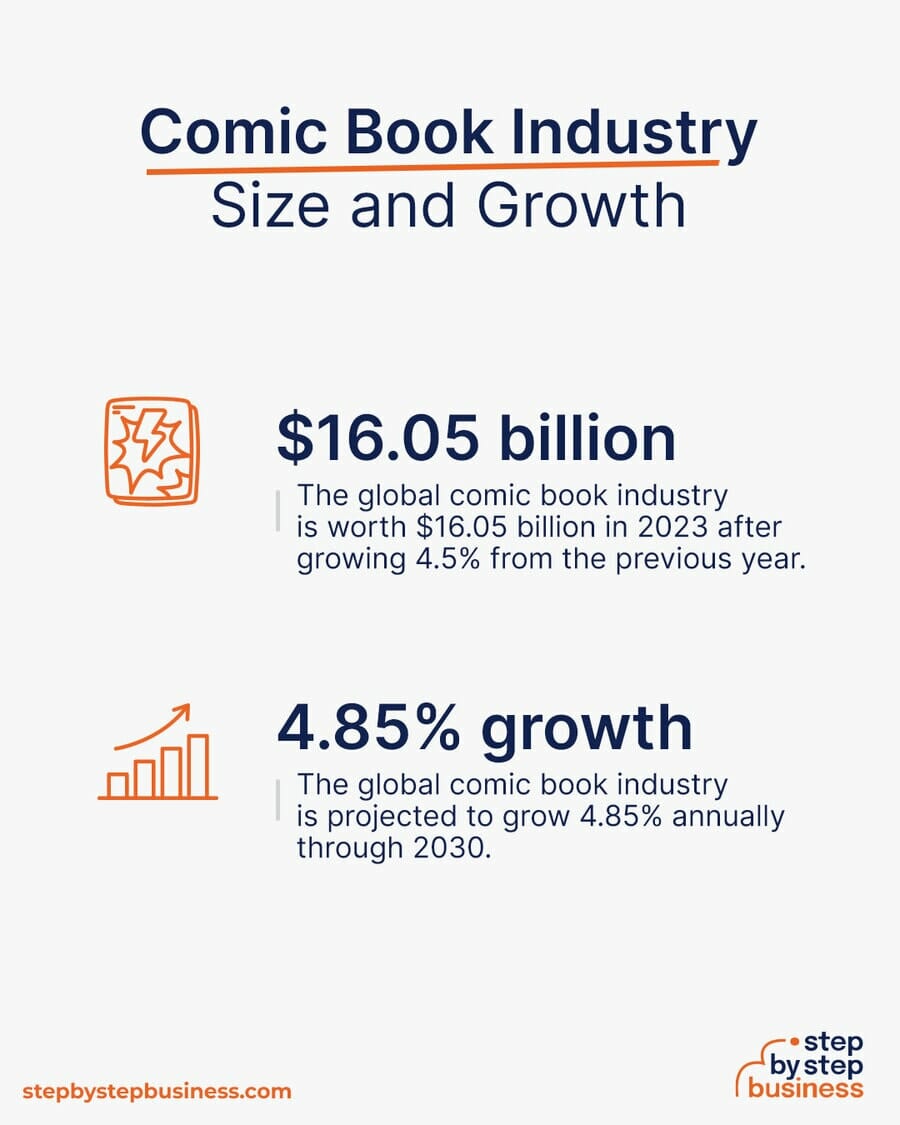
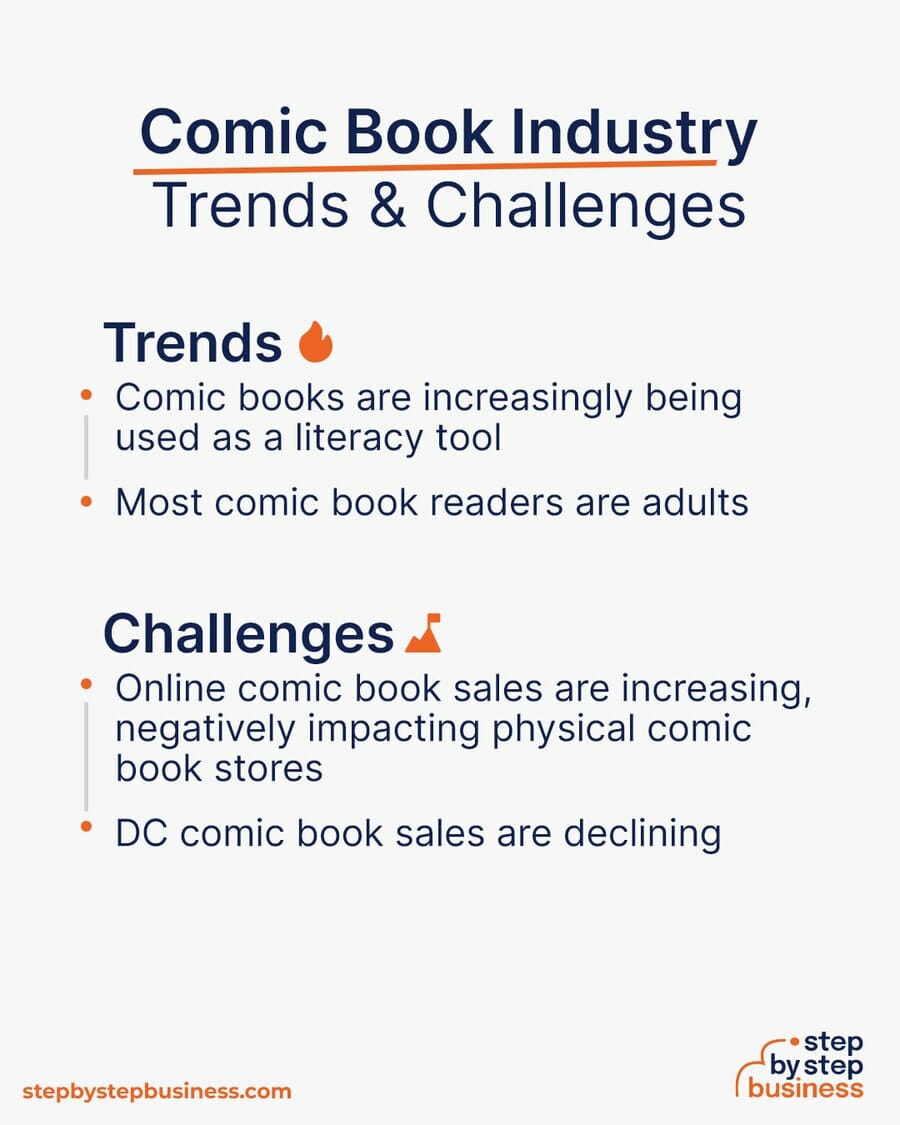
Trends
Challenges
Startup costs for a comic book store range from $14,000 to $28,000. Costs include the space rental and preparation and inventory.
You’ll need a handful of items to successfully launch your comic book store business, including:
| Start-up Costs | Ballpark Range | Average |
|---|---|---|
| Setting up a business name and corporation | $100 - $500 | $300 |
| Business licenses and permits | $100 - $300 | $200 |
| Insurance | $100-$500 | $300 |
| Website | $500 - $1,000 | $750 |
| Space rental and preparation with shelving | $3,000 - $5,000 | $4,000 |
| Inventory | $10,000 - $20,000 | $15,000 |
| Sales and marketing budget | $500 - $1,000 | $750 |
| Total | $14,300 - $28,300 | $21,300 |
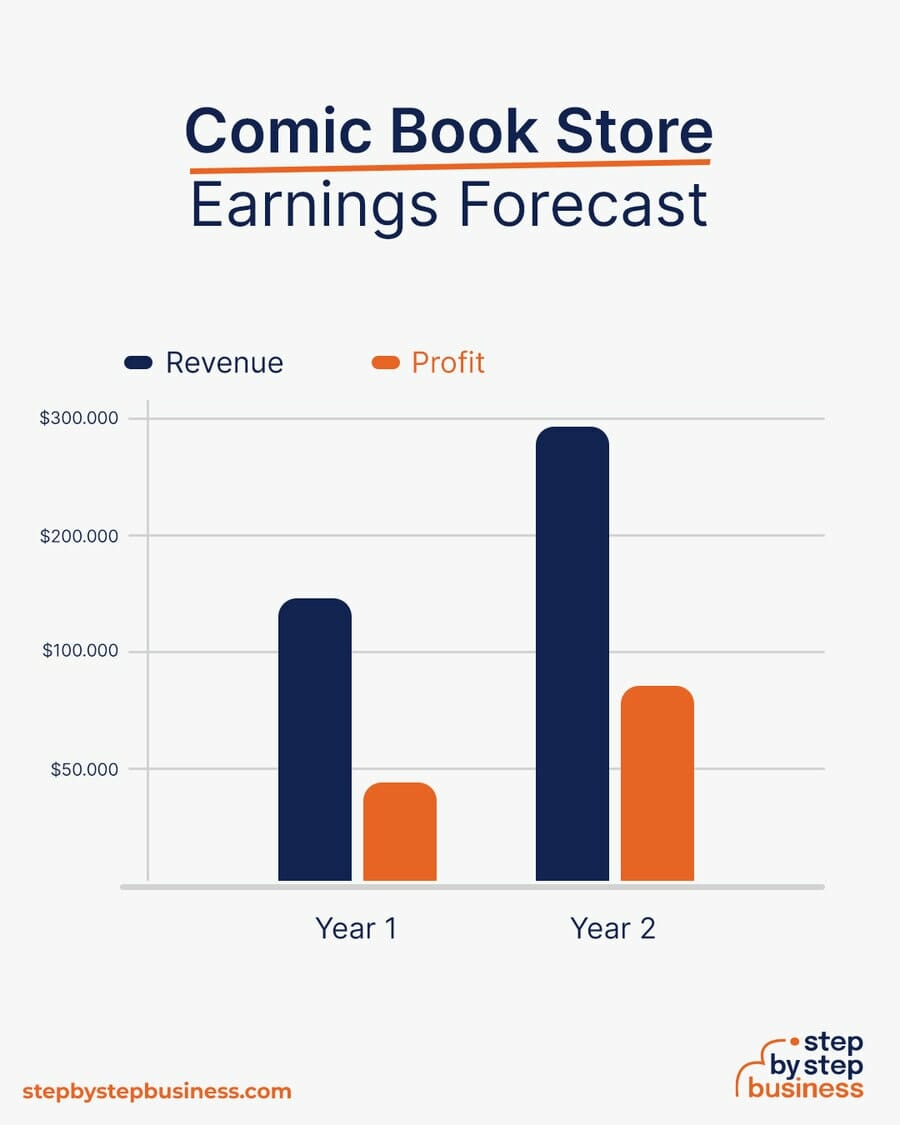
The average price of a comic book is about $4, but you’ll be able to charge much more for vintage and rare comic books. These calculations will assume an average total sale per customer of $20. Your profit margin should be about 30%.
In your first year or two, you might have 20 customers a day, 360 days a year, bringing in $144,000 in revenue. This would mean $43,200 in profit, assuming that 30% margin.
As you gain traction, you might have 40 customers a day. With annual revenue of $288,000, you’d make a tidy profit of $86,400.
There are a few barriers to entry for a comic book store. Your biggest challenges will be:

Now that you know what’s involved in starting a comic book store, it’s a good idea to hone your concept in preparation to enter a competitive market.
Market research could give you the upper hand even if you’ve got the perfect product. Conducting robust market research is crucial, as it will help you better understand your customers, your competitors, and the broader business landscape.
Research comic book stores in your area to examine their products, price points, and customer reviews.
This should identify areas where you can strengthen your business and gain a competitive edge to make better business decisions.
You’re looking for a market gap to fill. For instance, maybe the local market is missing a comic book store that sells valuable comics and graphic novels, or a comic shop that has a variety of related items such as action figures.
You might consider targeting a niche, such as rare Marvel comics or Dark Horse comics.
This could jumpstart your word-of-mouth marketing and attract clients right away.
You’ll likely offer new comics from brands like Marvel Comics, DC Comics, Dark Horse Comics, and Image Comics, but you’ll also want to find and sell vintage and rare comics. You could also sell graphic novels, and comic related items like action figures or posters.
Your prices should be based on market prices, but also on your costs to acquire the comics.
Once you know your costs, use this Step By Step profit margin calculator to determine your mark-up and final price points. Remember, the prices you use at launch should be subject to change if warranted by the market.
A comic book store’s primary target market includes comic book enthusiasts and collectors, spanning all ages.
With the popularity of comic-based movies and TV shows, casual readers and fans of pop culture have become significant customers. Many stores also attract gamers, merchandise collectors, and readers of manga and graphic novels.
Additionally, events and workshops hosted by the store can draw attendees interested in specific activities or local talent.
The store’s specific offerings, location, and surrounding community further refine its target demographic.
You’ll need to rent out a small space for your store. You can find commercial space to rent in your area on sites such as Craigslist, Crexi, and Instant Offices.
When choosing a commercial space, you may want to follow these rules of thumb:

Here are some ideas for brainstorming your business name:
Once you’ve got a list of potential names, visit the website of the US Patent and Trademark Office to make sure they are available for registration and check the availability of related domain names using our Domain Name Search tool. Using “.com” or “.org” sharply increases credibility, so it’s best to focus on these.
Finally, make your choice among the names that pass this screening and go ahead and reserve your business name with your state, start the trademark registration process, and complete your domain registration and social media account creation.
Your business name is one of the key differentiators that sets your business apart. Once you pick a name, reserve it and start with the branding, it’s hard to switch to a new name. So be sure to carefully consider your choice before moving forward.
Here are the key components of a business plan:

If you’ve never created a business plan, it can be an intimidating task. You might consider hiring a business plan specialist to create a top-notch business plan for you.
Registering your business is an absolutely crucial step — it’s the prerequisite to paying taxes, raising capital, opening a bank account, and other guideposts on the road to getting a business up and running.
Plus, registration is exciting because it makes the entire process official. Once it’s complete, you’ll have your own business!
Your business location is important because it can affect taxes, legal requirements, and revenue. Most people will register their business in the state where they live, but if you are planning to expand, you might consider looking elsewhere, as some states could offer real advantages when it comes to comic book stores.
If you’re willing to move, you could really maximize your business! Keep in mind, it’s relatively easy to transfer your business to another state.
Business entities come in several varieties, each with its pros and cons. The legal structure you choose for your comic book store will shape your taxes, personal liability, and business registration requirements, so choose wisely.
Here are the main options:

We recommend that new business owners choose LLC as it offers liability protection and pass-through taxation while being simpler to form than a corporation. You can form an LLC in as little as five minutes using an online LLC formation service. They will check that your business name is available before filing, submit your articles of organization, and answer any questions you might have.
Choose Your State
The final step before you’re able to pay taxes is getting an Employer Identification Number, or EIN. You can file for your EIN online or by mail or fax: visit the IRS website to learn more. Keep in mind, if you’ve chosen to be a sole proprietorship you can simply use your social security number as your EIN.
Once you have your EIN, you’ll need to choose your tax year. Financially speaking, your business will operate in a calendar year (January–December) or a fiscal year, a 12-month period that can start in any month. This will determine your tax cycle, while your business structure will determine which taxes you’ll pay.
The IRS website also offers a tax-payers checklist, and taxes can be filed online.
It is important to consult an accountant or other professional to help you with your taxes to ensure you are completing them correctly.
Securing financing is your next step and there are plenty of ways to raise capital:

Bank and SBA loans are probably the best option, other than friends and family, for funding a comic book store business. You might also try crowdfunding if you have an innovative concept.

Starting a comic book store business requires obtaining a number of licenses and permits from local, state, and federal governments.
Federal regulations, licenses, and permits associated with starting your business include doing business as (DBA), health licenses and permits from the Occupational Safety and Health Administration (OSHA), trademarks, copyrights, patents, and other intellectual properties, as well as industry-specific licenses and permits.
You may also need state-level and local county or city-based licenses and permits. The license requirements and how to obtain them vary, so check the websites of your state, city, and county governments or contact the appropriate person to learn more.
You could also check this SBA guide for your state’s requirements, but we recommend using MyCorporation’s Business License Compliance Package. They will research the exact forms you need for your business and state and provide them to ensure you’re fully compliant.
This is not a step to be taken lightly, as failing to comply with legal requirements can result in hefty penalties.
If you feel overwhelmed by this step or don’t know how to begin, it might be a good idea to hire a professional to help you check all the legal boxes.
Before you start making money, you’ll need a place to keep it, and that requires opening a bank account.
Keeping your business finances separate from your personal account makes it easy to file taxes and track your company’s income, so it’s worth doing even if you’re running your comic book store business as a sole proprietorship. Opening a business bank account is quite simple, and similar to opening a personal one. Most major banks offer accounts tailored for businesses — just inquire at your preferred bank to learn about their rates and features.
Banks vary in terms of offerings, so it’s a good idea to examine your options and select the best plan for you. Once you choose your bank, bring in your EIN (or Social Security Number if you decide on a sole proprietorship), articles of incorporation, and other legal documents and open your new account.
Business insurance is an area that often gets overlooked yet it can be vital to your success as an entrepreneur. Insurance protects you from unexpected events that can have a devastating impact on your business.
Here are some types of insurance to consider:


As opening day nears, prepare for launch by reviewing and improving some key elements of your business.
Being an entrepreneur often means wearing many hats, from marketing to sales to accounting, which can be overwhelming. Fortunately, many websites and digital tools are available to help simplify many business tasks.
You may want to use industry-specific software, such as Lightspeed, Zebra, or Manage Comics, to manage your inventory, purchases, and sales.
Website development is crucial because your site is your online presence and needs to convince prospective clients of your expertise and professionalism. You can create your own website using services like WordPress, Wix, or Squarespace. This route is very affordable, but figuring out how to build a website can be time-consuming. If you lack tech-savvy, you can hire a web designer or developer to create a custom website for your business.
Your customers are unlikely to find your website, however, unless you follow Search Engine Optimization (SEO) practices. SEO will help your website appear closer to the top in relevant search results, a crucial element for increasing sales.
Make sure that you optimize calls to action on your website. Experiment with text, color, size, and position of calls to action such as “Buy Now” or “Order”. This can sharply increase purchases.
Here are some powerful marketing strategies for your future business:

Unique selling propositions, or USPs, are the characteristics of a product or service that sets it apart from the competition. Customers today are inundated with buying options, so you’ll have a real advantage if they are able to quickly grasp how your comic book store meets their needs or wishes. It’s wise to do all you can to ensure your USPs stand out on your website and in your marketing and promotional materials, stimulating buyer desire.
Global pizza chain Domino’s is renowned for its USP: “Hot pizza in 30 minutes or less, guaranteed.” Signature USPs for your comic book store business could be:
You may not like to network or use personal connections for business gain. But your personal and professional networks likely offer considerable untapped business potential. Maybe that Facebook friend you met in college is now running a comic book store business, or a LinkedIn contact of yours is connected to dozens of potential clients. Maybe your cousin or neighbor has been working in comic book stores for years and can offer invaluable insight and industry connections.
The possibilities are endless, so it’s a good idea to review your personal and professional networks and reach out to those with possible links to or interest in comic book stores. You’ll probably generate new customers or find companies with which you could establish a partnership.

As your business grows, you will likely need workers to fill various roles. Potential positions for a comic book store business include:
At some point, you may need to hire all of these positions or simply a few, depending on the size and needs of your business. You might also hire multiple workers for a single role or a single worker for multiple roles, again depending on need.
Free-of-charge methods to recruit employees include posting ads on popular platforms such as LinkedIn, Facebook, or Jobs.com. You might also consider a premium recruitment option, such as advertising on Indeed, Glassdoor, or ZipRecruiter. Further, if you have the resources, you could consider hiring a recruitment agency to help you find talent.

As a comic fan, you already have some valuable insight into the comic book market that can help you to be successful. With your own comic book store, you’ll be meeting like-minded people, having fun, and getting a share of a $16 billion market.
You’ve got the business know-how now, so you’re ready to stock up on comic books and get your store up and running!

Published on April 1, 2023
People go to flea markets for all sorts of reasons. Some look for bargains, some seek out treasures and collectibles, while still others just go tos ...
Read Now
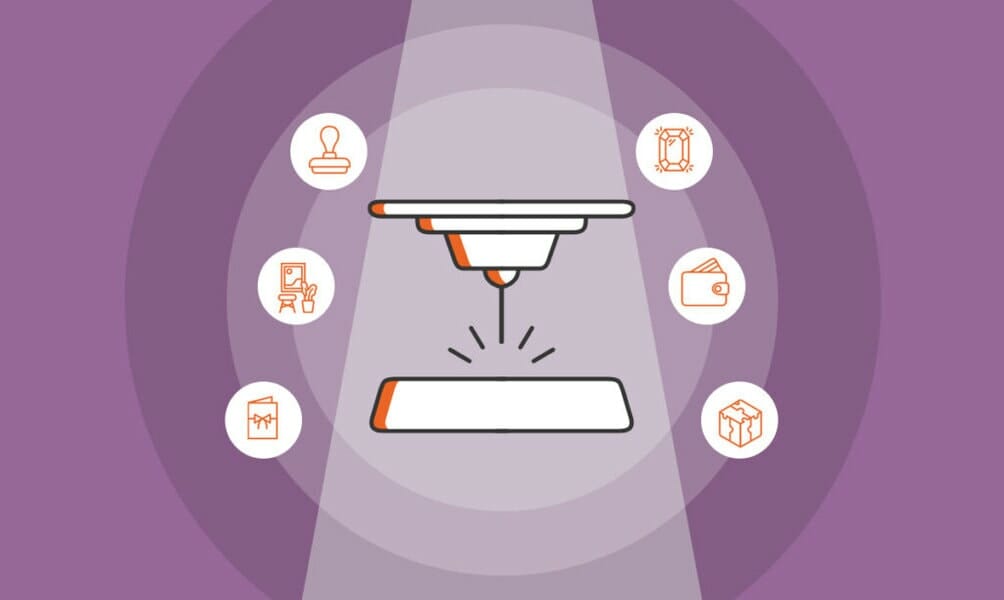
Published on December 21, 2022
Thinking of turning your crafting talent into a business? A Glowforge 3D Laser Printer can produce valuable goods and big profits with its precisecu ...
Read Now

Published on June 6, 2022
One of the few industries that experienced a pandemic-driven boom is crafting. And within that market one of the segments that performed best isCric ...
Read Now
No thanks, I don't want to stay up to date on industry trends and news.
Do people actually take this AI drivel seriously? If you’re thinking about opening a comic shop and you read down this far—this is not good advice. The numbers are nonsense, and they misunderstand industry basics.